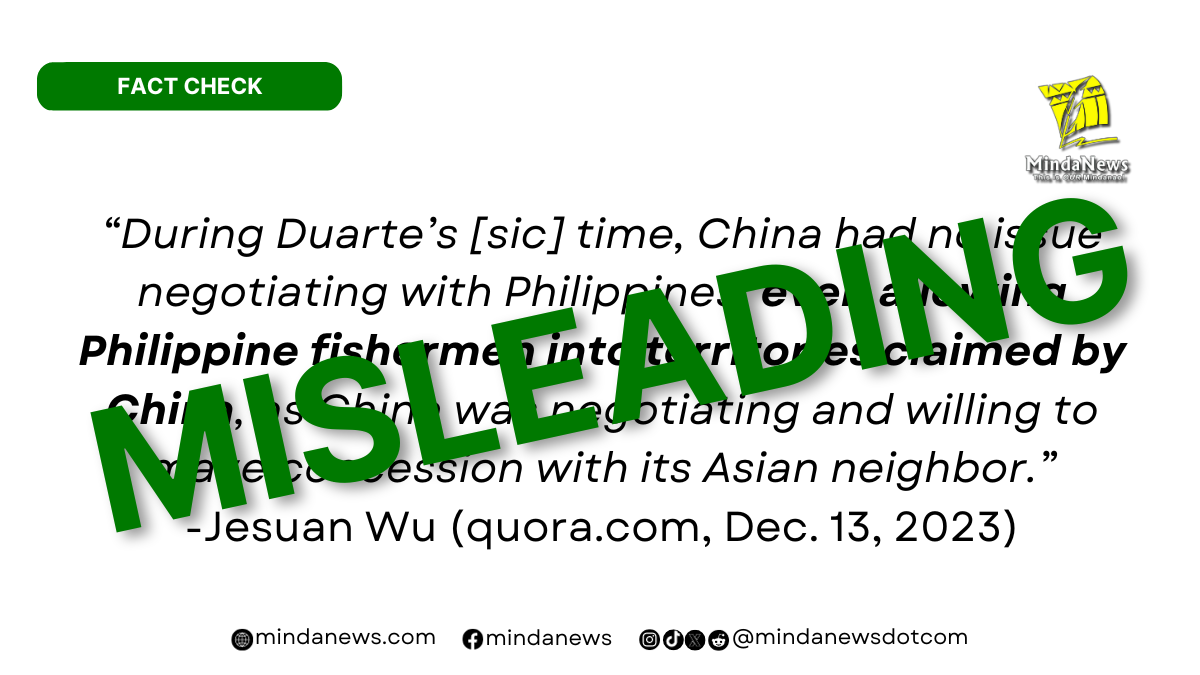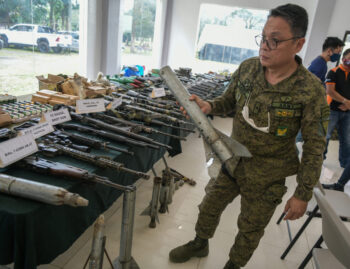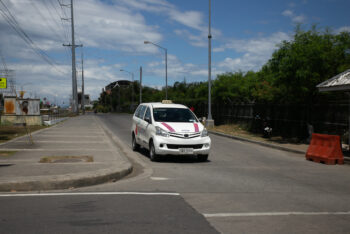
On December 22, Jun Abines posted on his Facebook page, where he describes himself as a writer, an item from quora.com containing a reply to the question “Do you believe the Philippines should give up its claims to China?” The question was referring to the disputed waters and features in the West Philippine Sea (WPS) that have been awarded to the country based on the July 12, 2016 decision of the Hague-based Permanent Arbitral Tribunal.
Quora is a question-and-answer website where users can ask questions on various topics and receive answers from other users.
Abines, whose page had 29,000 followers as of Monday (January 1), shared the reply to the question from Jesuan Wu (1,161 followers). Wu’s reply to the question had 47,900 views as of Tuesday, January 2. Citing his answer, Abines described Wu as a “level-headed Chinaman.”
In his reply, Wu said the Philippines should not give up its claim since the Chinese position is “peaceful co-development” (misspelled as peacefil co-developement).
“During Duarte’s [sic] time, China had no issue negotiating with Philippines, even allowing Philippine fishermen into territories claimed by China, as China was negotiating and willing to make concession with its Asian neighbor,” he said. [emphasis supplied]
However, Manuel Mogato, in an article published on onenews.ph on August 7, 2023, listed some incidents of Chinese “bullying” against Filipino fishermen in the WPS during the Duterte administration.
Duterte served as president from June 30, 2016 to June 30, 2022.
Mogato is a Filipino journalist who won the Pulitzer Prize for International Reporting in 2018 together with Reuters colleagues Clare Baldwin and Andrew R.C. Marshall for their coverage of the Duterte administration’s war on drugs. He is currently editor-at-large at PressONE.ph.
“Three Chinese coast guard vessels forced a Philippine resupply mission in the West Philippine Sea to abort by blocking and spraying with water canon [sic] two supply boats on their way to Ayungin (Second Thomas) Shoal on Nov. 16, 2021,” Mogato wrote.
“On June 9, 2019, Filipino fishing boat Gem-Ver 1 sank after being rammed by a Chinese vessel near Recto Bank in the West Philippine Sea. The offending vessel abandoned the Filipino boat with 22 crew members, leaving them to the “mercy of the elements,” according to the Department of National Defense,” he stated in the article.
For its part, CNN Philippines, in an article published on January 27, 2021, reported that Larry Hugo, a longtime fisherman, “was on his way to a regular fishing area near the Philippine-occupied Pag-asa Island when he was blocked by a ship of the China Coast Guard – the latest reported harassment of Filipino fishermen by Chinese vessels in the West Philippine Sea.”
“Akala ko po dadaan lang ang barko. Bigla pong humarang sa may dadaanan ko,” Hugo told CNN Philippines in an online interview on Wednesday. “Saka may paparating pa na lima hanggang anim na barko, lahat tumatakbo rin papunta sa lugar na ‘yon.”
[Translation: I thought the ship was just passing by. It suddenly blocked my way. There were also five to six other vessels going in the same direction.]
The incident happened on January 25, 2021.
Benarnews.org, in the article Filipino Fishermen Feel Effects from Beijing’s Expansionism in South China Sea published in May 2021, narrated how China has made it harder for Filipino fishers to access prime fishing in the WPS.
One of the fishermen interviewed by Benarnews was Henrylito Empoc.
“We used to be able to go there (Scarborough Shoal) and catch big fishes, making our lives easier. Now, they are driving us away and accusing us of poaching in our waters,” BenarNews quoted Empoc as saying.
China is claiming sovereign rights over nearly the entire South China Sea, including the WPS, which belongs to the Philippines Exclusive Economic Zone. In its July 12, 2016 decision, the Arbitral Tribunal in The Hague invalidated China’s historic claims and “nine-dash line” under the United Nations Convention on the Law of the Sea.
As with all our other reports, MindaNews welcomes leads or suggestions from the public to potential fact-check stories.
MindaNews is a verified signatory to the Code of Principles of the International Fact-Checking Network.(H. Marcos C. Mordeno / MindaNews)








